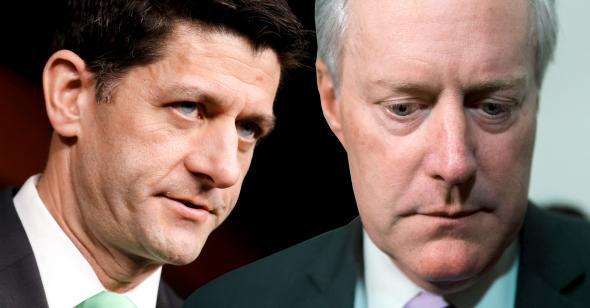Since House Speaker Paul Ryan unveiled the Republican plan to repeal and replace Obamacare earlier this month, one of the biggest mysteries around the bill has revolved around how it should treat deregulation. Why would Ryan include some deregulatory elements in the American Health Care Act but not others—and specifically, why wouldn’t he include ones that might prove key to unlocking conservative votes? That mystery has been solved. And that’s bad news for Paul Ryan.
For weeks, Republican leadership justified this stance by saying that the Senate rules simply wouldn’t allow them to put deregulatory elements like the elimination of essential health benefits into the reconciliation bill since they didn’t directly affect the budget. But on Wednesday, once it became clear that the bill wouldn’t have the votes otherwise, Donald Trump signed off on adding that portion. Once that was negotiable, all hell broke loose. It became perfectly clear why Ryan never wanted to go down this path of negotiating the “off-limits” portions of the bill. You don’t just risk blowing up your Congressional Budget Office score. More and more of the already reluctant moderates begin to bail on the bill while conservatives, smelling blood, only demand more concessions. This is precisely what happened on Thursday afternoon, causing a surprise delay of a scheduled vote. Members will only say that negotiations are still “ongoing.” But going where?
Every health care action has an equal and opposite reaction in the vote count. The reports that Trump was making a deal Wednesday night with the Freedom Caucus to eliminate essential health benefits—shrewdly titled by the Obama administration, as few vulnerable lawmakers want to be on record as voting to “repeal essential health benefits”—sent moderates fleeing. Pennsylvania Rep. Charlie Dent, the most prominent House moderate and chair of the Tuesday Group, announced he would be a no. Rank-and-file members, meanwhile, have been streaming in and out of Ryan’s office almost without interruption since Wednesday evening, and other high-profile moderates have declared their opposition.
With moderates gone, the weight was placed on the Freedom Caucus to supply all of the missing votes. The problem for Ryan, which he surely foresaw, was that once you concede that an aspect of the bill presumed to be off-limits was, in fact, negotiable, everything else was on the table. It’s unclear whether President Donald “The Ultimate Closer” Trump foresaw this as well. The outcome is the same either way: Trump offered the Freedom Caucus its central request—an essential health benefits repeal—but a deal still hadn’t been closed by Thursday morning. That meant the Freedom Caucus wanted more.
Freedom Caucus members maintain that their request has always been to repeal not just the essential health benefits, but much of the rest of the law’s regulatory architecture: community rating requirements, medical-loss ratio requirements, and—yes—the requirement that customers can’t be discriminated against for pre-existing conditions.
“On the mandates, you can’t just remove one part,” Michigan Rep. Justin Amash, perhaps the most opposed member of the group, said Thursday. “They all interact.”
“We’ve been consistent on what we’ve asked from day one,” Freedom Caucus Chairman Mark Meadows told me Thursday. The Freedom Caucus had just concluded a lengthy private meeting after having visited with the president. The congressman described those internal deliberations as not quite “contentious” but “rigorous.” Meadows, who now needs police escorts to navigate the sea of reporters following his every move, drew the vast press encampment that was waiting outside that meeting directly to him, while the other Freedom Caucus members snuck out of a back door. “If anything, we have made it more reasonable in our requests, not more unreasonable,” Meadows said.
I don’t know about that. For most of this week, members had been emphasizing that essential health benefits were the key to their votes. Today their message is that eliminating essential health benefits alone makes the system more dysfunctional, and you need to take down the rest of the system to create a functional market. As has been so frustratingly true with the Freedom Caucus throughout the process, each new gripe is both ideologically coherent and excruciatingly poor politics. Remove the protections for those with pre-existing conditions, and Ryan may lock up the Freedom Caucus’ elusive votes. He just wouldn’t get any others.
Moderates are furious, and conservatives are right where they were on Wednesday: wanting more. The whole framework could be unspooling. One can see why Ryan wanted to leave much of the deregulatory work to the discretion of Health and Human Services Secretary Tom Price: It wouldn’t need to be negotiated in Congress, it wouldn’t have needed to pass any CBO tests, and Price could have managed himself to try to ensure that the changes wouldn’t fatally disrupt markets or blow a hole through the federal budget overnight.
The easy part ended on Wednesday, though. More meetings are scheduled throughout Thursday night, and leaders still hope to hold a vote in the next day or two. But first they need to come up with a bill.
